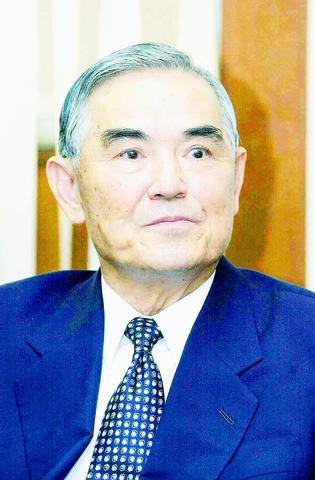Since being diagnosed in June with liver cancer, Chuang Ming-yao, 73, had been in and out of the hospital. Despite their best efforts, doctors at at the Taipei Veterans General Hospital were unable to stop the cancer spread.
"Chuang was a respected man, a very hard-working individual," said Wu Shi-wen (
"If he [Chuang] took as good care of his health as he did with his work, he would still be alive," Wu added.

PHOTO: CHIANG YING-YING, TAIPEI TIMES
On behalf of President Chen Shui-bian (
Yu said that the Presidential Office would help Chuang's family take care of Chuang's funeral arrangements.
Chuang was highly regarded by both Chen and former president Lee Teng-hui (李登輝) due to his military experience and his expertise in Japan-related affairs.
Chuang's career included service as commander of 142nd fleet, the president of the navy's non-commissioned officers' school, the chief-of-staff at Navy General Headquarters, vice minister of national defense and the first Taiwanese ever to hold the position of naval commander-in-chief.
Though Chuang ended his military career by stepping down as naval commander-in-chief after the murder case of naval captain Yin Ching-feng (
In 1996, Chuang served as Taiwan's de facto-ambassador to Japan and when Chen assumed the presidency in May 2000, Chuang was tapped by Chen to return to Taiwan to serve as secretary-general of the National Security Council.
The Yin murder case brought the Lafayette frigate weapons procurement scandal to the surface, during which military officials and arms brokers were jailed on charges including bribery and leaking military secrets.
The murder case, which remains unsolved, had dogged Chuang whenever frequent rumors citing Chuang's relationship to Yin surfaced.
Many believe that Chuang, though not directly involved in the murder, as the navy's top official must have harbored information related to the murder case.
In August of last year, Chen re-designated Chuang to head the Association of East Asian Relations to take advantage of his expertise and relations with prominent figures in Japan.
"Coming from a military background, Chuang made remarkable use of his decision-making and maneuvering skills in dealing with diplomatic affairs," said Chu Wen-ching (
Chu said that through Chuang's effort and diplomacy skill, "he contributed much to the advancement of relations between Taiwan and Japan."
Examples such as the 1998 resumption of air travel between Taipei and Osaka, which had been terminated after the two nations cut diplomatic ties in 1972, as well as the Japanese government's decision to loosen restrictions on Taiwanese tourists' multiple-entry visas, well illustrate his diplomatic capacity.
Chu said that it was through Chuang's lobbying efforts that when Chinese President Jiang Zemin (

CHAOS: Iranians took to the streets playing celebratory music after reports of Khamenei’s death on Saturday, while mourners also gathered in Tehran yesterday Iranian Supreme Leader Ayatollah Ali Khamenei was killed in a major attack on Iran launched by Israel and the US, throwing the future of the Islamic republic into doubt and raising the risk of regional instability. Iranian state television and the state-run IRNA news agency announced the 86-year-old’s death early yesterday. US President Donald Trump said it gave Iranians their “greatest chance” to “take back” their country. The announcements came after a joint US and Israeli aerial bombardment that targeted Iranian military and governmental sites. Trump said the “heavy and pinpoint bombing” would continue through the week or as long

TRUST: The KMT said it respected the US’ timing and considerations, and hoped it would continue to honor its commitments to helping Taiwan bolster its defenses and deterrence US President Donald Trump is delaying a multibillion-dollar arms sale to Taiwan to ensure his visit to Beijing is successful, a New York Times report said. The weapons sales package has stalled in the US Department of State, the report said, citing US officials it did not identify. The White House has told agencies not to push forward ahead of Trump’s meeting with Chinese President Xi Jinping (習近平), it said. The two last month held a phone call to discuss trade and geopolitical flashpoints ahead of the summit. Xi raised the Taiwan issue and urged the US to handle arms sales to

State-run CPC Corp, Taiwan (CPC, 台灣中油) yesterday said that it had confirmed on Saturday night with its liquefied natural gas (LNG) and crude oil suppliers that shipments are proceeding as scheduled and that domestic supplies remain unaffected. The CPC yesterday announced the gasoline and diesel prices will rise by NT$0.2 and NT$0.4 per liter, respectively, starting Monday, citing Middle East tensions and blizzards in the eastern United States. CPC also iterated it has been reducing the proportion of crude oil imports from the Middle East and diversifying its supply sources in the past few years in response to geopolitical risks, expanding

Pro-democracy media tycoon Jimmy Lai’s (黎智英) fraud conviction and prison sentence were yesterday overturned by a Hong Kong court, in a surprise legal decision that comes soon after Lai was jailed for 20 years on a separate national security charge. Judges Jeremy Poon (潘兆初), Anthea Pang (彭寶琴) and Derek Pang (彭偉昌) said in the judgement that they allowed the appeal from Lai, and another defendant in the case, to proceed, as a lower court judge had “erred.” “The Court of Appeal gave them leave to appeal against their conviction, allowed their appeals, quashed the convictions and set aside the sentences,” the judges